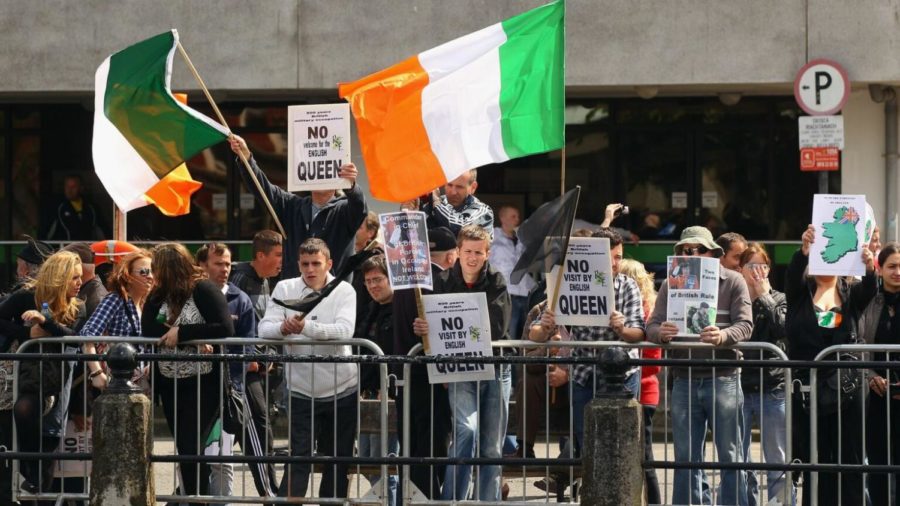Your donation will support the student journalists of Bettendorf High School . Your contribution will allow us to purchase equipment and cover our annual website hosting costs.
The death of Elizabeth II prompted mixed reactions from the Irish
September 27, 2022
CORK, IRELAND – MAY 20: Protesters demonstrate against the state visit by Queen Elizabeth II as she traveled to English Market on May 20, 2011 in Cork, Ireland. The Duke and Queen’s visit to Ireland was the first by a monarch since 1911. (Photo by Oli Scarff/Getty Images)
Britain is famous for having colonies on every continent, with the exception of Antarctica. But their empire began close to home, as Normans invaded the country of Ireland in 1169, making the land its first colony and reigning over the island for 700 years.
The original sentiment of the occupation was mockery, Ireland made a joke out of the English. And in the wake of Elizabeth II’s death, the Irish population continues to share their generational trauma and dislike for the monarchy through humor on social media, specifically Twitter, Reddit and Tiktok.
“Hey lads, when ye refer to royalty in the future can ye specify a country,” said one Reddit user. “I was saddened to hear of the queen’s passing but when I looked her up she’s still alive and well. Long live Queen Letizia of Spain.”
“My sister lives in Northern Ireland and just texted saying the neighborhood has started lighting fireworks lmao,” said another Twitter user, receiving 559,000 likes and 49,000 retweets.
History plays a large part in Ireland’s disdain for the British, specifically, their monarchy. One of the most significant eras was “The Troubles,” a period spanning from the early 60s to the late 90s in Northern Ireland between Protestants who wanted to stay a part of Britain and Irish Catholics who hoped they’d unite with Ireland; more than 3,500 people died in the conflict, with a ceasefire being confirmed in 1998 and continuing into the present day.
One Reddit user reflected on the previous generation’s sentiments. “Look, all I know is plenty of old folks have been drinking heavily since yesterday, but not cause of mourning.”
In 2011, the Queen became the first English monarch to visit Ireland since 1911. A year later, the royal shook hands with the First Minister of Northern Ireland, Martin McGuinness, a former commander of the Irish Republican Army, a paramilitary group.
The IRA, in protest of the reunification of the two countries, used violent tactics during the Northern Ireland conflict, including killing the Queen’s cousin in 1979.
During a speech at Dublin Castle, Elizabeth II apologized for the treatment Ireland received during England’s reign.
“To all those who have suffered as a consequence of our troubled past, I extend my sincere thoughts and deep sympathy. With the benefit of historical hindsight, we can all see things which we would wish had been done differently or not at all.”
But such sympathies have not sufficed for the Irish Catholic population, a majority of which still believe in the reunification of Ireland.
“Her reign was incredibly long. I’m just wondering if she’s got it in her will to give the six counties back.” said a Northern Irish Reddit user, referring to the six counties of Northern Ireland.
While under Britain’s rule, the Irish planned countless uprisings, but England’s brutality continued, with one of the most significant events in Irish history being argued as a British genocide. To many in Ireland, the Potato Famine is a symbol of oppression under English rule, a trauma that continues to affect the Irish population both mentally and physically, as several studies have been conducted on the negative famine effects in later generations.
According to a study by the Cold Spring Harbor Laboratory, “What apparently is far less obvious is its impact on the health and wellbeing of Ireland’s surviving population, those who did not themselves succumb to starvation and disease, and who stayed on the island rather than moved abroad,”
“Those born during Ireland’s famine suffered this ecological shock in the most crucial developmental stage in their lives and experienced devastating and often permanent health consequences, ranging from chronic disease to early death.”
In an article by Claire Parker, writer for “The Washington Post,” the mental effect of the British reign is still mentally manifesting.
Anne Marie Quilligan, a social care worker from Ireland’s Limerick region, said the Irish suffer from a sort of “collective trauma.” While Hannah Wanebo, an Irish American lawyer based in Dallas, wrote on Twitter that her Irish grandmother “hated England so much that she would only travel home on flights that did not touch down on English soil.”
With the past still leaving a bitter taste, it isn’t surprising that the joy of the Queen’s death extended beyond the internet. Twitter has shared videos of a crowd of Irish football fans chanting “Lizzie’s in a box,” protesters shoving a casket labeled “The British Empire,” over the railing of a bridge and a museum in Belfast displayed a sign with the words “England is Ireland’s Enemy.”’
Ireland, historically fond of mockery, has continued to share their distaste for the English monarchy, and in turn, the Queen. For the Irish, the legacy of Elizabeth II is directly connected to the awful effects of colonization, thus, many give their condolences to the British public, but do not personally have sympathy for the monarch’s passing.
Yvonne Murray, an English woman who moved to Ireland during the Northern Ireland conflict shared the following: “I often quip you can be anything in Ireland now, as long as it’s not English.”
